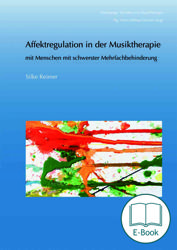Developmental psychological knowledge shows that a balanced emotional state is the basis of any positive development. Depending on the developmental age and situation, people with severe multiple disabilities need specific support from their caregivers to regulate affects. This book shows which physical and mimic behaviors indicate dysregulated affects. Developmental psychological-oriented music therapy is described, which has measurable effects on the emotional state and, therefore, on the contact and relationship skills of severely multiply handicapped people.
People with severe multiple disabilities have difficulties in making contact with other people due to lack of language. Desires and needs often are not understood. Thus, they are even more in need of caregivers who perceive their physical and emotional expression, give it a meaning and respond appropriately. Often, however, stereotypical, self-stimulating or self-injurious behavior provides caregivers and therapists with great challenges. These behaviors complicate not only contact with fellow human beings and the environment, but also affect the developmental opportunities of people with severe multiple disabilities.
Findings in developmental psychology show that a regulated emotional state is the basis of any positive development. When emotions are regulated sufficiently, a person can focus their attention on the environment and make positive experiences. But how can a person be supported in the regulation of their emotions?
The book "Affect regulation in music therapy with people with severe multiple disabilities" describes the development of affect regulation from the viewpoint of developmental psychology. It shows that a person, depending on their developmental age, needs specific support from their caregivers to regulate their affects. These findings are the basis of a developmentally oriented music therapy, especially for the treatment of dysregulated affects. In order to demonstrate the positive impact of specific music therapy interventions, videos were analyzed from music therapy sessions with people with severe multiple disabilities. The results show that a developmentally oriented music therapy has positive effects on the emotional state of people with severe multiple disabilities and, therefore, also on their abilities to connect and relate. Through interventions that activate the proprioception, dysregulated affects can be integrated.
This book lays the foundation for a theory-based application of music therapeutic interventions in working with people with severe multiple disabilities. Individuals from related professions and caregivers can also benefit from the principles and interventions presented here.
„Dieses Buch legt den Grundstein für eine theoretisch fundierte Anwendung musiktherapeutischer Interventionen in der Arbeit mit Menschen mit schwerster Mehrfachbehinderung. Auch angrenzende Berufsgruppen und Bezugspersonen können von den hier dargestellten Grundlagen und den daraus entwickelten Interventionen profitieren.“
Von Silke Reimer
In: MuG am 26.3.2019 (?)
Silke Reimer, Dr. rer. sc. mus., geb. 1972. Instrumentalpädagogin, Musiktherapeutin DMtG und Psychotherapie (HPG). Seit 1999 als Musiktherapeutin in einem Wohnheim für Menschen mit schwerster Mehrfachbehinderung tätig, von 2008 – 2013 Musiktherapie mit Kindern mit tiefgreifender Entwicklungsstörung, seit 2008 Dozentin am Zentralinstitut für Weiterbildung der Universität der Künste Berlin. Mitarbeit an verschiedenen Forschungsprojekten mit dem Schwerpunkt „Entwicklungspsychologisch orientierte Musiktherapie“.


 Table of Contents
Table of Contents